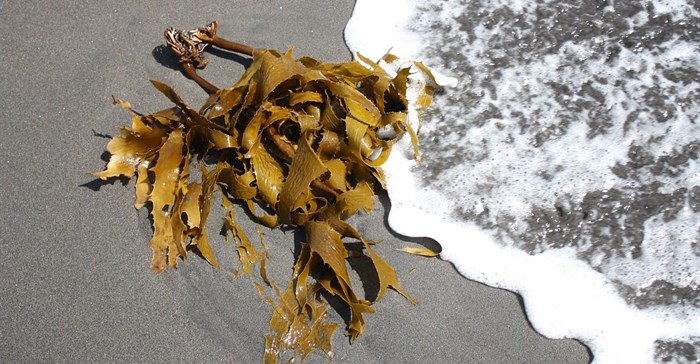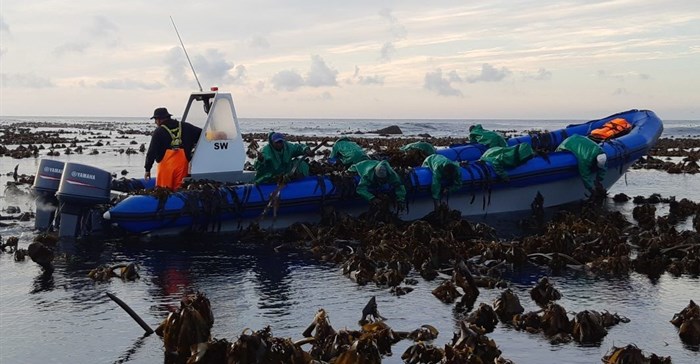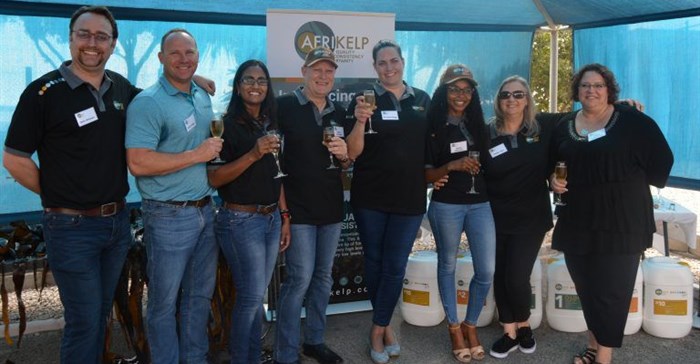
Top stories

Marketing & MediaWarner Bros. was “nice to have” but not at any price, says Netflix
Karabo Ledwaba 5 hours





More news




















The many uses of kelp, especially the uniquely South African species Ecklonia maxima, was first discovered by Klaus Rotmann, a Namibian who registered the first kelp company in South Africa in 1971 and is now based in Gansbaai. In 1976, South Africa (SA) received its first rights to harvest kelp from the ocean.
Afrikelp is currently the largest concession holder of kelp in SA. Their concession covers a large area in Gansbaai as well as the east coast. Afrikelp is the only concession holder with concessions for two species namely Ecklonia maxima (commonly known as sea bamboo) and Gelidium pristoides (red seaweed). The red seaweed is mostly used for Agar production and is exported mainly to Japan. SA seaweed is renowned for producing the best agar-agar with the highest gel strength. The sea bamboo is used as a biostimulant for agricultural crops.

There are many kelp species and each one is unique. Ecklonia maxima, or sea bamboo, is found only at the southern tip of SA and nowhere else in the world. Due to strong currents along the SA coastline it grows in very turbulent waters and to survive it must grow very fast to get to the surface to reach the sun. Sea bamboo can grow up to 7m tall and can grow up to 15cm a day. Due to this unique survival mechanism, this type of kelp has the highest concentration of growth promoter hormones, which is the secret ingredient that makes it such a powerful biostimulant.
As a biostimulant applied to agricultural crops, kelp gives these plants increased access to additional nutrients by increasing root growth of the plants. Thus, kelp decreases stress in crops caused by drought, disease or other environmental impacts. The growth hormones or growth regulators are readily available in the kelp leaves because sea plants do not have root systems and thus these hormones are readily available in the plant itself.
Sea bamboo is especially high in the growth regulator auxin. All plants, on land and sea, naturally contain the growth hormones auxin and cytokinin which are always in flux to help plants grow. By spraying kelp on plants, it keeps the balance between these two hormones in check to help with root growth, flowering and fruit set and helps fruit colour more evenly.
Because of the high levels of natural auxin found in sea bamboo, it is easily absorbed by other plants. Although a chemical or synthetic version of these hormones is available, plants take a while to adapt to it. Trials done by Afrikelp have shown that the number of roots on crops treated with sea bamboo were always more than the control group of plants. With more roots, crops can absorb more nutrients and is therefore more resilient against disease and harsh environmental conditions.

Kelp is harvested from the ocean in specific areas, or concessions, regulated by the Department of Agriculture, Forestry and Fisheries (DAFF). Harvesting of kelp does not upset the ecology; it is heavily regulated by DAFF and there are only a few concession holders, which allows for only certain areas to be harvested, and only once every three months. The way the kelp is harvested also ensures that it remains sustainable to do so. Only the kelp fronds of the top part of the sea bamboo are cut and grows back like hair. The whole plant is never taken. Harvesting is done early in the morning around 5am by a small crew that goes out with a boat. They have about half an hour to two hours a day to harvest, depending on the weather and the tide.
Once the harvest has been completed, the kelp is taken to the factory in Gansbaai where the plants are washed to remove small animals that live on the kelp (epiphytes) as well as sand. The epiphytes such as mussels are returned to the ocean. The washed kelp is then chopped and minced before it is put through the extraction process. A cold micronation process (CMP) is used to extract the kelp. Solids and liquids are separated and then filtered for a second and third time. Preservatives are added to ensure a long shelf life.
On the day of the visit to Afrikelp they officially launched a new completely organic product to support the growing organic sector that is especially booming abroad. The only difference between the two products is the preservatives used. The organic product contains bioflavonoids derived from citrus and is therefore a bit more expensive than the non-organic product.
In the agricultural industry the tree crop sector, including fruit and nut trees, was the first to give attention to the amazing benefits of kelp. But row crops soon followed and it has been used successfully on grains as well as oilseeds. For the fruit industry, kelp’s main benefits include better fruit set when sprayed during budding or flowering as well as improved colouring of fruit when sprayed in later stages of production. Trials have shown that a harvest can improve by 6 tons or more when treated with kelp. Since fruit quality is improved by using kelp, trials have shown that it could mean an increase of 10 tons of fruit for exports. For maize it is mostly applied in the early stages to stimulate root growth.
Easy application makes the use of kelp especially beneficial. It can be applied by foliar application, drenching and boom application. It can also easily be mixed with other products such as pesticides, which means that farmers do not have to apply it in an additional step, thereby increasing labour costs. Trials for mixing with roundup has shown positive results; kelp boosts the root growth of weeds as well as plants thus allowing them to absorb the roundup even better; neutral pH means it mixes easily with other chemicals since it has no interaction and does not cause mineral imbalances as other products do.
Although dry kelp chips are also exported and extracted after export, most of the Afrikelp products are exported in its ready-to-use liquid form. Afrikelp sends a sample of each batch of liquid kelp to the University of Dresden to ensure that every batch has the same amount of auxin, the active ingredient that improves root growth. A problem previously found with trials done on kelp is that some tests show amazing results and others not so good because the auxin levels differ in each batch. Agfrikelp will soon be ISO 9000-1 approved.
Afrikelp is exported to over 70 countries including Australia, China, United States (US), South America, Russia and several African countries. Only 20% of the product is used locally, mostly because farmers in other countries are subsidised and can experiment with novel products such as biostimulants. An interesting fact to add to its international popularity is that Afrikelp is used on 80% of soccer fields in Germany to keep their fields in top condition.
On the day of the presentation at Afrikelp in Gansbaai, farmers shared their testimonies of using Afrikelp on various agricultural crops. Jaap van der Westhuizen, who uses Afrikelp on his dryland grains in the Free State states that he included kelp in his own trials he runs on his farm. He now uses it on his maize and soya fields because it is easy to apply and can be mixed with roundup. He says that it helps a lot in dryland production to give crops stronger roots, thereby helping the plant to access more moisture.
Marinus Neethling, a fruit farmer from the lowveld, also shared his testimony. He farms mainly with citrus, as well as avocado, litchi and blueberries. He says that kelp is used as part of their standard recipe for citrus and works especially well during flowering and fruit set. For blueberries, which can be a very sensitive crop, it reduces stress. He prefers using Afrikelp because it contains only natural hormones and is produced locally, making it more affordable than imported kelp products. They are using it increasingly to reduce residue levels on fruit for the export market. On their sugar cane plantations, it has increased yield because it stimulates better root development.
Hannes Bruwer, a farmer from the Northern Cape shared his experience with Afrikelp. With the province well known for its low rainfall, Bruwer says that it is especially useful to stimulate new root growth in grain crops that are often plagued by root diseases in the region. They also successfully use it on young pecan nut seedlings to establish good root growth from a tender age. –Ursula Human, Farmbiz

AgriOrbit is a product of Centurion-based agricultural magazine publisher Plaas Media. Plaas Media is an independent agricultural media house. It is the only South African agricultural media house to offer a true 360-degree media offering to role-players in agriculture. Its entire portfolio is based on sound content of a scientific and semi-scientific nature.
Go to: http://agriorbit.com/